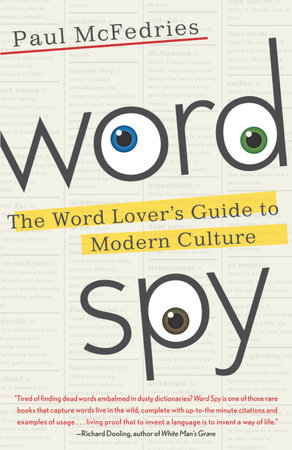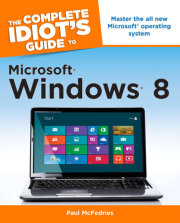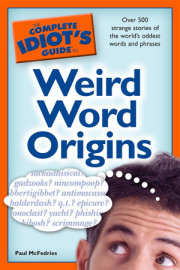Chapter 1
A Mosaic of New Words
A community is known by the language it keeps, and its words chronicle the times. Every aspect of the life of a people is reflected in the words they use to talk about themselves and the world around them. As their world changes--through invention, discovery, revolution, evolution, or personal transformation--so does their language. Like the growth rings of a tree, our vocabulary bears witness to our past. --John Algeo
The bold and discerning writer who, recognizing the truth that language must grow by innovation if it grow at all, makes new words and uses the old in an unfamiliar sense, has no following and is tartly reminded that "it isn't in the dictionary" although down to the time of the first lexicographer (Heaven forgive him!) no author ever had used a word that was in the dictionary. --Ambrose Bierce
ne-ol-o-gism noun A meaningless word coined by a psychotic. --Merriam-Webster's Collegiate Dictionary
What could be more relevant, more interesting, more fun than new words? Well, yes, lots of things. However, for many people a newly minted word is one of life's little pleasures, something that can be counted among what James Boswell called "the small excellencies." But then there are those of us who have been stricken with a malady that I call neologophilia, the intense attraction--oh, why not say it?--the love of new words.
This ailment's happy sufferers exhibit an unvarying collection of symptoms: an untrammeled glee at coming across a new word in a book or newspaper; an unquenchable curiosity about life, because, as you'll see, new words lead us into new worlds; an unending wonder at the amazing plasticity of the language and at the relentless creativity of those who use it; and an unceasing urge to coin new words (and, of course, an unabashed desire to weave these new coinages into cocktail party conversations).
I came down with this affliction many years ago, and I've been clam-happy ever since. I enjoy words and language in general, but what sets my crank a-turning is, as H. L. Mencken said, "the biology of language, as opposed to its paleontology." I love the living language more than the fossilized variety with its hardened meanings and set-in-stone lexicon. To put it another way, although I get as much pleasure as anyone out of a dictionary, the words it contains are, well, domesticated. I love the wild, untamed neologisms that romp around the linguistic wilderness. When I see a new word in an article or book, I get a little jolt of excitement, a mental shock akin to seeing an animal live for the first time while walking in the woods. I'm not looking to hunt the word, or tame it, or capture it for inclusion in some kind of lexical zoo. Instead, I take a snapshot of the word--I record the source and the citation--that shows the word in its natural environment.
And that, more than anything, explains what this book is all about. It's a series of cultural snapshots, with the lens focused on new words and phrases that tell us something about our world. These snapshots cover various slices of modern life, including relationships, business, technology, war, aging, multiculturalism, and even fast food. I define each word, tell you when it first appeared in print, provide a citation from the media that shows how the word is used, and give you some cultural background--stats, stories, trends, and tidbits--that put the word into context. Taken together, I hope these snapshots will form a larger picture of our modern culture. Have you ever seen one of those images that, when examined closely, turns out to be made up of thousands of smaller pictures? It's called a mosaic, and that's the metaphor that underlies this book. It's a mosaic of new words.
Why go to all this trouble? After all, aren't new words, at best, mere trifles soon to be forgotten or, at worst, signs of linguistic decay? I have to respond with a big, fat "No!" on both counts. It's my unshakable belief that, putting it as simply as I can, new words matter. Why? Two reasons: new words reflect our culture, and they have universal appeal.
New Words Reflect Our Culture
Words are a mirror of their times. By looking at the areas in which the vocabulary of a language is expanding fastest in a given period, we can form a fairly accurate impression of the chief preoccupations of society at that time and the points at which the boundaries of human endeavour are being advanced. --John Ayto
Language wears many hats, but its most important job is to help us name or describe what's in the world. As the American writer and editor Howard Rheingold says, "Finding a name for something is a way of conjuring its existence, of making it possible for people to see a pattern where they didn't see anything before." So we have nouns for things, verbs for actions, and adjectives and adverbs for describing those things and actions. But the world changes. Constantly. New things are created; old things are modified; light bulbs are appearing over people's heads all the time, signaling new ideas and theories; people do things differently; they look at existing things from new perspectives. Today's world is different in a thousand ways from yesterday's world.
So if language describes the world, and if the world changes, then language must also change as a way of keeping up with the world. We're compelled to create new words to name and describe our new inventions and ideas and institutions; we're driven to create new meanings for existing words to accommodate our newly modified things and actions.
It follows then--and this is the central premise of this book--that you can understand the culture by examining its new words, by going out to what one linguist calls the "vibrant edges" of language. However, it's not enough just to note the existence of a neologism and move on to the next one. Each new word reflects something about the culture, but you have to examine the word closely to see the details of that reflection. How is the word being used? Who is using it? What are the cultural factors that gave rise to and nourish the word's existence? Each new word opens a door (one writer likened them to "the doorbells of the mind") that leads you to a room with various cultural and sociological artifacts. The Czech playwright Daniela Fischerova said it best: "Every new word is a new reality."
New words both reflect and illuminate not only the subcultures that coin them, but also our culture as a whole. New words give us insight into the way things are even as they act as linguistic harbingers (or canaries in the cultural coal mine), giving us a glimpse of (or a warning about) what's to come. Here's the lexicographer Victoria Neufeldt on this neologism-as-cultural-reflection idea:
The neologisms that especially capture our attention are indeed often remarkable; some with their metaphorical baggage can constitute miniature sociological studies in themselves--like McJob, for instance, which for comprehension depends on all the associations and connotations of the name McDonald's, as well as an awareness of the difficulties of the current employment situation, in particular for new graduates wanting to enter the workforce.
New Words Have Universal Appeal
Slang . . . is a monument to the language's force of growth by creative innovation, a living example of the democratic, normally anonymous process of language change, and the chief means whereby all the languages spoken today have evolved from earlier tongues. --Mario Pei
Each new word is a story that tells us something about our lives and our times, but there are, as they say, a million stories in the naked city. New words and new meanings are coined with a breathtaking frequency and trying to catalog them all is like herding cats. Lexicographer Wendalyn Nichols says that language "is as easy to nail as Jell-O. It changes all the time."
My focus in this book and in my neological work in general is on new words that appear in print, since these records have some staying power and can be read and searched. But the brain of every person on the planet is a miniature word factory, and new coinages appear spontaneously as a natural part of everyday speech. Consider the following hypothetical snippet of conversation:
"Did you read MacWhoozit's column today?"
"Yeah, the man is a master at stating the obvious."
"I know. I counted no less than four, uh, obviosities."
"Obviosities? Is that a word?"
"Hmmm, let's see. If you can describe something as curious, then you can call that thing a curiosity, right?"
"Right."
"So, if you can describe something as obvious, then why not call that thing an obviosity?"
"Okay. But is it really a word?"
"Well, it is now!"
People do this kind of thing all the time. The linguist W. D. Whitney once called it "the natural delight of language-making." Human beings have this uncorkable creative streak that revels in creating new words (such as "uncorkable"). Victoria Neufeldt calls this "everyday" neology and says that it "produces the bulk of our neologisms. Such neology, far from being a separable linguistic phenomenon that manifests itself periodically or sporadically in response to social stimuli, in fact rises out of ordinary linguistic competence, what might be called the linguistic collective unconscious of the speech community" (emphasis added).
I view language not as a solid mountain to be admired from afar, but rather as an active volcano to be studied up close. This volcano is constantly spewing out new words and phrases; some of them are mere ash and smoke that are blown away by the winds; others are linguistic lava that slides down the volcano and eventually hardens as a permanent part of the language. But although volcanoes have periods of intense activity followed by periods of inactivity, word creation never stops. As the linguist Allan Metcalf has said, "You can hardly spend a day without coining a new word or two."
The universal appeal of neologisms is also reflected in their popularity. For example, my Word Spy mailing list, which is devoted to new words, has over 15,000 members. The Word Spy website (wordspy.com) gets over half a million visits each month. As well, many newspapers and magazines include lists of new words to accompany articles, and quite a few--including Wired, Time, Newsweek, and The Guardian--even include new word sections as a regular feature.
Then there is the phenomenon of the sniglet, "a word that doesn't appear in the dictionary, but should." This concept was created by the comedian Rich Hall in the 1980s and was for several years a part of the HBO comedy series Not Necessarily the News. Example sniglets include lactomangulation, "manhandling the 'open here' spout on a milk carton so badly that one has to resort to using the 'illegal' side," and peppier, "the waiter at a fancy restaurant whose sole purpose seems to be walking around asking diners if they want ground pepper." These coinages were collected into several books: Sniglets (1984), More Sniglets (1985), Unexplained Sniglets of the Universe (1986), Angry Young Sniglets (1987), and When Sniglets Ruled the Earth (1989). By 1990 these five slim volumes (they all weighed in under 100 pages) had sold an eyebrow-raising 1.4 million copies and had appeared collectively for more than 60 weeks on the New York Times bestseller list.
Clearly humans, as linguist Jean Aitchison has said, "mop up words like sponges." But it's also true that folks love creating new words and, in particular, they can't resist a contest. Ask people to come up with a new name or a new word for something, throw in a token prize, and stand back the next time the mail arrives.
Name contests are always popular. When the city of Toronto held a "Name the Dome" contest in 1987 to come up with a moniker for its newly built sports stadium (featuring a retractable roof), it received over 150,000 entries suggesting nearly 13,000 unique names. (The winning name was Skydome.) In 1996 the owners of the Washington Bullets basketball team decided it was time for a new team nickname, so they announced a contest that eventually garnered more than 500,000 entries, with the winner being the disappointingly dull name "Wizards." In 1947, when Borden Foods asked consumers to come up with a name for the new calf born to Borden's spokescow, Elsie, more than 3 million people replied. Unfortunately, the poor thing ended up being saddled with the unwieldy name Beauregard.
If there's one thing people hate, it's a gap in the language. What do you call the adult with whom you regularly go out on dates? ("Girlfriend" and "boyfriend" are too juvenile, and "lover" is too intimate, too romance-novelish.) What should we call the first decade of the 2000s? (We have the sixties, seventies, eighties, nineties, and then . . . what?) Why is there no genderless third-person singular pronoun? ("He" is traditional but is now considered politically incorrect; "they" is grammatically controversial.) Despite the language's half a million words, these kinds of gaps are legion, and contests to fill these gaps are a thriving cottage industry.
One of the earliest such contests was launched by a teetotaler named Delcevare King, who in 1923 was alarmed at the number of people who were flouting the U.S. Constitution's Eighteenth Amendment, which prohibited the manufacture and sale of liquor. Mr. King decided that what the world needed was a word to name these "lawless drinkers," these "scoffers." He offered a $200 prize (a princely sum in those days) for the best word. By the contest deadline, more than 25,000 people had responded with suggestions ranging from boozlaac to hooch-sniper to law-loose-liquor-lover. The winning entry, submitted independently by Kate Butler of Dorchester, Massachusetts, and Henry Dale of Andover, Massachusetts, was scofflaw, a word that found a permanent place in the language, although today it refers to anyone who ignores or disregards the law.
In a 1940 contest people were asked to come up with a name for the porters who worked at the Airlines Terminal in New York. According to an article in the December 24, 1940, edition of the New York Herald Tribune (unearthed by etymologist Barry Popik and posted to the American Dialect Society mailing list), 2,780 people vied for the $100 prize, which was won by Willie Wainwright of New Orleans, Louisiana. His suggested word was skycaps, another neologism that's still in use today.
One-time-only contests generate a lot of responses, but there is enough interest in coining new words to support contests that run regularly. The veteran of this genre is Bob Levey of the Washington Post, who has been running a monthly neology contest for over 20 years. He describes a person or situation for which a word doesn't exist and asks his readers to coin a suitable term. (Example: The sound made when pulling two strips of Velcro apart. The winning term: velch.) The first contest, announced on November 19, 1982, elicited 1,089 suggestions. These days he gets over 3,000 responses for each contest.
Copyright © 2004 by Paul McFedries. All rights reserved. No part of this excerpt may be reproduced or reprinted without permission in writing from the publisher.









